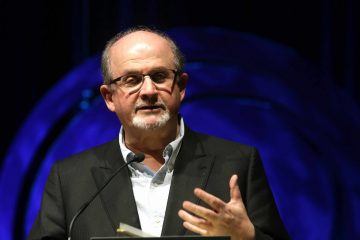Daniel James Sharp in Quillette:
 The novel’s protagonists are Indian-born Muslims. Saladin is a voiceover artist and an immigrant from Bombay to London whose shame about his Indian-ness and desire to be anglicised form the backdrop to a complex interrogation of what it means to be rootless and how migrants in a globalised world can find a sense of identity. Gibreel, meanwhile, is a legend of the Bombay movie scene whose recent health crisis has led him to lose his faith and travel to London to be with the woman he loves, Alleluia Cone. Famous for portraying Hindu gods on screen, Gibreel’s newfound archangelic nature sorely tests his mind—a newly godless man condemned to act as God’s (or is that Satan’s?) right hand on earth.
The novel’s protagonists are Indian-born Muslims. Saladin is a voiceover artist and an immigrant from Bombay to London whose shame about his Indian-ness and desire to be anglicised form the backdrop to a complex interrogation of what it means to be rootless and how migrants in a globalised world can find a sense of identity. Gibreel, meanwhile, is a legend of the Bombay movie scene whose recent health crisis has led him to lose his faith and travel to London to be with the woman he loves, Alleluia Cone. Famous for portraying Hindu gods on screen, Gibreel’s newfound archangelic nature sorely tests his mind—a newly godless man condemned to act as God’s (or is that Satan’s?) right hand on earth.
But both protagonists are hybrids who contain elements of the saintly and the diabolical. They both face challenges and crises of identity. Through them, Rushdie explores what it means to lose and then find one’s identity and what the true experience is of migrants whose rootlessness and existence in a foreign culture leads to a crisis of selfhood. The intermingling of elements—culture, language, religion—is celebrated, while the concept of purity in identity and culture is repudiated as too constricting.
More here.
